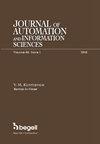INFORMATION TECHNOLOGY TOOLS FOR CONTROLLED EVOLUTION
Q3 Engineering
Journal of Automation and Information Sciences
Pub Date : 2021-10-01
DOI:10.34229/1028-0979-2021-5-9
引用次数: 1
Abstract
Information and technological tools for controlled evolution are considered as a basis for a transdisciplinary approach to building a scientific picture of the world from the standpoint of the noospheric theory of V.I. Vernadsky and assessment of complexity of the system, which evolves. The noospheric theory appeals to scientific thought able to direct the evolutionary process to create a harmonious unity of the system «Human — Nature». It became the basis of the concept of sustainable development of human society. The central issue of the controlled evolution is building a scientific picture of the world related to solving complex scientific and practical problems from the standpoint of a comprehensive account of the entire set of factors, which affects the process of evolution. The emerging transdisciplinary theory as a science can provide a solution of these problems by developing methods and tools for interdisciplinary interaction while forming the integrated knowledge. An example of such interaction is a purposeful convergence of disciplines and their related technologies and as a result — the development of promising convergence clusters. Best known today is NBIC cluster (nano–bio–information–cognitive technologies). One of the central principals of transdisciplinarity states: knowledge of the laws of nature is single and indivisible. The main aspects of cognitive evolution are considered, which combine the evolution of the mechanism of human thinking (with the dominance of the logical-verbal type) and improving the life cycle of constructive knowledge and its use. The possibilities of modern cognitive intelligent technologies in relation to the development of a consolidated intelligence, an ontologically controlled knowledge market and a national diversified developing control system by the type of National Automated System (NAS) of V.M. Glushkov are analyzed. In this regard, special emphasis is placed on the development of service-oriented systems for research design which can be adapted to a many classes of tasks, can be extended functionally and intellectually. In conclusion, it is emphasized that the projection of the work on the general theory of evolution on the practical needs of Ukraine in terms of the strategy of its sustainable development is appropriate and presents a state-alone very important direction of scientific research and practical developments with applied using of the results and provisions set forth in this paper.用于受控进化的信息技术工具
控制进化的信息和技术工具被认为是跨学科方法的基础,从V.I.Vernadsky的半球理论和对进化系统复杂性的评估的角度来构建世界的科学图景。正午理论呼吁科学思想能够指导进化过程,创造“人与自然”系统的和谐统一。它成为人类社会可持续发展观的基础。受控进化的核心问题是从全面考虑影响进化过程的整套因素的角度,构建一幅与解决复杂科学和实践问题相关的世界科学图景。新兴的跨学科理论作为一门科学,可以在形成综合知识的同时,通过开发跨学科互动的方法和工具来解决这些问题。这种互动的一个例子是学科及其相关技术的有目的的融合,从而发展出有前景的融合集群。今天最著名的是NBIC集群(纳米-生物-信息-认知技术)。跨学科国家的核心原则之一是:对自然规律的认识是单一和不可分割的。认知进化的主要方面被考虑在内,它结合了人类思维机制的进化(与逻辑言语类型的主导)和改善建设性知识的生命周期及其使用。分析了现代认知智能技术在发展综合智能、本体论控制的知识市场和V.M.Glushkov的国家自动化系统(NAS)类型的国家多元化发展控制系统方面的可能性。在这方面,特别强调开发面向服务的研究设计系统,该系统可以适应许多类别的任务,可以在功能和智力上进行扩展。最后,强调进化论的一般理论工作对乌克兰可持续发展战略的实际需求的预测是恰当的,并通过应用本文中的结果和规定,为科学研究和实际发展提供了一个非常重要的方向。
本文章由计算机程序翻译,如有差异,请以英文原文为准。
求助全文
约1分钟内获得全文
求助全文
来源期刊

Journal of Automation and Information Sciences
AUTOMATION & CONTROL SYSTEMS-
自引率
0.00%
发文量
0
审稿时长
6-12 weeks
期刊介绍:
This journal contains translations of papers from the Russian-language bimonthly "Mezhdunarodnyi nauchno-tekhnicheskiy zhurnal "Problemy upravleniya i informatiki". Subjects covered include information sciences such as pattern recognition, forecasting, identification and evaluation of complex systems, information security, fault diagnosis and reliability. In addition, the journal also deals with such automation subjects as adaptive, stochastic and optimal control, control and identification under uncertainty, robotics, and applications of user-friendly computers in management of economic, industrial, biological, and medical systems. The Journal of Automation and Information Sciences will appeal to professionals in control systems, communications, computers, engineering in biology and medicine, instrumentation and measurement, and those interested in the social implications of technology.
 求助内容:
求助内容: 应助结果提醒方式:
应助结果提醒方式:


